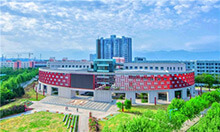武汉科技大学资源与环境工程学院安全工程专业简介

武汉科技大学资源与环境工程学院安全工程专业简介内容如下,更多考研资讯请关注我们网站的更新!敬请收藏本站,或下载我们的考研派APP和考研派微信公众号(里面有非常多的免费考研资源可以领取,有各种考研问题,也可直接加我们网站上的研究生学姐微信,全程免费答疑,助各位考研一臂之力,争取早日考上理想中的研究生院校。)
微信,为你答疑,送资源

武汉科技大学资源与环境工程学院安全工程专业简介 正文
一、培养目标本专业培养能适应社会主义市场经济建设需要,在德、智、体、美、劳等全面发展,具有社会职业素养、沟通合作意识、国际视野、学习和创新精神,了解安全科学与工程学科发展、掌握安全生产理论与技术、工业通风与防尘、消防安全技术与方法、安全应急管理和职业安全卫生等相关基础理论、专业知识和基本技能,善于应用现代信息技术和管理技术,能够在安全工程领域,从事安全科学研究、风险辨识与评价、安全技术研究与设计、安全监督与管理、安全检测与监控、安全教育与培训、应急管理与救援等工作的高素质应用型人才,期待毕业生五年左右达到以下目标:
1、具备扎实的数学、自然科学基础知识,良好的人文素养、社会责任感和职业道德;
2、掌握安全科学与工程专业领域的基础理论和专业知识,具有安全技术开发、安全工程设计、安全管理与培训、安全评价、火灾风险评估等方面的创新意识和工程实践能力;
3、具有良好的表达和沟通能力以及团队合作和组织管理能力,且能够在一个团队中作为骨干或者领导有效地发挥作用;
4、在安全管理、职业卫生、安全评价、火灾风险评估等领域具有就业竞争力,并有能力进入研究生阶段学习;
5、具有终身学习的意识,具备不断学习和适应发展的能力;
6、具有一定的国际视野、交流与合作能力。
I.Training objectives
This major education can satisfy the need of socialist market economy construction, develop in morality, intelligence and physique etc., possess social professional quality, communication and cooperation, international view, learning and innovation consciousness, understand the development of safety science and engineering discipline, master the theory and technology of safety production, industrial ventilation and dust prevention, fire safety technology and method, safety emergency management and occupational safety and health related basic theories, professional knowledge and basic skills, good at application of modern information and management technology. The graduate will become high quality applied talents in the field of safety science, risk identification and evaluation, security technology research and design, safety supervision and management, safety inspection and monitoring, safety education and training, emergency management and rescue. After five years, graduates will achieve the following goals:
Graduates of this major are supposed to achieve the following aims after five years:
1. Possessing basic knowledge of mathematical and natural science, good humanistic accomplishment, social responsibility and professional ethics.
2. Mastering the basic theory and professional knowledge in the field of safety science and engineering, and having the innovative consciousness and engineering practice ability in safety technology and engineering design, safety management and training, safety assessment, fire risk assessment, etc.
3. Having well expression and communication ability, as well as teamwork and organizational management skills, and being able to be a core member or a leader in a team.
4. Being competitive in the fields of safety management, occupational health, safety assessment, fire risk assessment, etc, and are qualified to further study after the graduation.
5. Having a sense of lifelong learning and development adaptive ability.
6. Having the ability of international vision, communication and cooperation.
二、毕业要求
1、工程知识:能够将数学、自然科学、工程基础和专业知识用于解决安全工程领域复杂工程问题。
2、问题分析:能够应用数学、自然科学和工程科学的基本原理,识别、表达、并通过文献研究分析安全工程等专业领域复杂工程问题,以获得有效结论。
3、设计/开发解决方案:能够针对安全工程专业领域复杂工程问题提出解决方案,设计满足特定需求的系统、单元(部件)或工艺流程,并能够在设计环节中体现创新意识,考虑社会、健康、安全、法律、文化以及环境等因素。
4、实验设计与信息处理:能够基于科学原理并采用科学方法对安全工程领域复杂工程问题进行研究,包括设计实验、分析与解释数据、并通过信息综合得到合理有效的结论。
5、现代工具的应用:能够针对安全工程领域复杂工程问题,开发、选择与使用恰当的技术、资源、现代工程工具和信息技术工具,包括对复杂工程问题的预测与模拟,并能够理解其局限性。
6、工程师社会责任意识:能够基于工程相关背景知识进行合理分析,评价安全工程领域工程实践和复杂工程问题解决方案对社会、健康、安全、法律以及文化的影响,并理解应承担的责任。
7、环境和可持续发展:能够理解和评价针对复杂工程问题的安全工程及相关专业工程实践对环境、社会可持续发展的影响。
8、职业道德与规范:具有人文社会科学素养、社会责任感,能够在安全工程及相关工程实践中理解并遵守工程职业道德和规范,履行责任。
9、团队合作:能够在多学科背景下的团队中承担团队成员以及负责人的角色。
10、沟通:能够就安全工程领域复杂工程问题与业界同行及社会公众进行有效沟通和交流,包括撰写报告和设计文稿、陈述发言、清晰表达或回应指令。并具备一定的国际视野,能够在跨文化背景下进行沟通和交流。
11、项目管理:理解并掌握安全工程领域管理原理与经济决策方法,并能在多学科环境中应用。
12、终身学习:具有自主学习和终身学习的意识,有不断学习和适应发展的能力。
II.Requirements
1. Engineering knowledge: With the ability of using mathematics, natural sciences, basic and professional knowledge in engineering to solve complex engineering problems in the field of safety engineering.
2. Problem analysis: Identifying, expressing, and analyzing the complex engineering problems in safety engineering area with the literature research methods to obtain effective conclusions, basing on the application of basic principles of mathematics, natural sciences and engineering science.
3. Design / develop solutions: Providing solutions solve the complex problems in the field of safety engineering. Designing systems, units (components) or processes meet specific needs. With the ability of embodying innovation awareness as well as the factors of society, health, safety, law, culture, environment, etc, in the designing process.
4. Experimental design and information processing: Researching complex engineering problems in the field of safety engineering by scientific methods based on scientific principles, including experiments designing, data analysis and interpretation, to obtain reasonable and effective conclusions through comprehensive information analysis.
5. Using modern tools: With the ability of developing, selecting and using appropriate technologies, resources, modern engineering tools, information technology tools to solve complex engineering issues in the field of safety engineering, including the prediction and simulation of complex engineering problems and understanding its limitation.
6. Engineers’ sense of social responsibility: With the ability of making reasonable analysis based on the relevant engineering background, to evaluate the impact of the engineering practice and complex engineering solutions in the field of safety engineering on society, health, safety, legal and culture as well as understanding the corresponding responsibility.
7. Environment and sustainable development: With the ability of understanding and evaluating the impact of safety engineering and related professional engineering practices of complex engineering problems on the environmental and social sustainable development.
8. Professional ethics and norms:With high sense of humanities and social science literacy, social responsibility, understanding and observing engineering ethics and norms in safety engineering and related engineering practice.
9. Individual and team:Be able to play a role as a team member or a team manager in multi-disciplinary environment.
10. Communication:Be able to communicate effectively with industry peers and the public on complex engineering issues in the field of safety engineering, including writing reports, designing documents, presenting statements, clearly expressing or responding to directives. Communicating and exchanging ideas within the cross-cultural background with international perspective.
11. Project management:With the ability of understanding and mastering the management principles and economic decision-making methods in the field of safety engineering, and be able to apply them in multi-disciplinary environment.
12.Lifelong time learning:With the sense of independent learning and lifelong time learning awareness, as well as the continuous learning and development adaptive ability.
武汉科技大学
添加武汉科技大学学姐微信,或微信搜索公众号“考研派小站”,关注[考研派小站]微信公众号,在考研派小站微信号输入[武汉科技大学考研分数线、武汉科技大学报录比、武汉科技大学考研群、武汉科技大学学姐微信、武汉科技大学考研真题、武汉科技大学专业目录、武汉科技大学排名、武汉科技大学保研、武汉科技大学公众号、武汉科技大学研究生招生)]即可在手机上查看相对应武汉科技大学考研信息或资源。


本文来源:http://www.okaoyan.com/wuhankejidaxue/yanjiushengyuan_315106.html
推荐阅读
-

武汉科技大学(4212)考点2022年硕士研究生网上报名须知
根据教育部《年全国硕士研究生招生工作管理规定》和湖北省教育考试院《年湖北省硕士研究生考试网上报名须知》要求,为做好我校年硕士研究生考试报名工作,现就有关事项公告如下:一、总……
日期:09-29 阅读量:23465 -

武汉科技大学研究生学费标准
学制和学费标准学制:年社会工作、国际商务(全日制)专业学制年。学费:各招生专业学费标准以湖北省物价局审批为准。……
日期:07-29 阅读量:21563 -

武汉科技大学研究生奖学金评定办法
第一章总则第一条为了贯彻党和国家的教育方针,促进研究生德、智、体、美全面发展,培养社会主义事业合格建设者和可靠接班人,根据教育部《普通高等学校学生管理规定》,结合我校实际情……
日期:07-29 阅读量:23789 -

2021考研武汉科技大学文法与经济学院拟录取研究生名单公示
近日,研究生拟录取名单已出。考研的同学们有没有关注?今天考研派小编就整理了武汉科技大学文法与经济学院年硕士研究生招生考试拟录取名单的相关内容,希望能对大家有所帮助。点开此链……
日期:06-02 阅读量:2817 -

2021考研武汉科技大学恒大管理学院拟录取研究生名单公示
恒大管理学院年硕士研究生复试名单公示挂网恒大管理学院年硕士研究生复试名单公示……
日期:06-02 阅读量:22622 -

2021年武汉科技大学博士研究生复试录取通知
依据教育部相关文件精神,按照按需招生、全面衡量、择优录取、宁缺毋滥的原则,结合当前疫情防控要求和学校实际,特制定我校年博士研究生复试录取工作方案。一、组织工作学校研究生招生……
日期:05-13 阅读量:21333 -

武汉外语外事职业学院机电技术学部简介
机电技术学部是武汉外语外事职业学院主要的工科学部,在学院的正确领导下,以特色建系,持续发展为指导思想,以质量树信誉,以特色创优势,以人才创品牌,力争年建成外院一流的工科系。……
日期:06-02 阅读量:21170 -

武汉外语外事职业学院医学部简介
、学部概况武汉外语外事职业学院于年经湖北省人民政府批准成立,并经国家教育部备案,属专科层次全日制普通高校。学院与武汉科技大学城市学院共一个投资方,共一个校区,共享所有资源。……
日期:06-02 阅读量:24649 -

武汉外语外事职业学院信息技术学部数字媒体应用技术简介
一、广告设计与制作方向、培养目标培养适应平面设计、动画制作、网页设计等工作需要,具有较扎实的广告专业基础理论知识和职业素质,掌握广告设计、制作、策划、网页设计、动画制作等知……
日期:06-02 阅读量:22431 -

武汉外语外事职业学院信息技术学部计算机应用技术专业简
一、软件信息技术方向、培养目标培养学生掌握计算机应用技术的专业知识与基本技能,培养能够达到软件企业要求掌握软件设计与开发的主流技术、符合企业要求的高素质技能型专门人才。该专……
日期:06-02 阅读量:22250 -

武汉外语外事职业学院信息技术学部软件技术专业介绍
软件开发方向、培养目标培养具有扎实的计算机基础知识和现代软件工程的基本理论及专业知识;掌握计算机应用软件的分析、设计和开发方法;掌握主流软件开发平台和软件开发技术;熟练使用……
日期:06-02 阅读量:24584 -

武汉外语外事职业学院信息技术学部简介
信息技术学部是武汉外语外事职业学院重点学部之一,开设有计算机应用技术、数字媒体应用技术和软件技术三个专业,在校学生人。毕业生就业率保持在以上,遍布北京、上海、广州、深圳、杭……
日期:06-02 阅读量:23813 -

武汉外语外事职业学院旅游与管理学部空中乘务专业简介
专业名称:空中乘务一、培养目标本专业培养适应民用航空业发展需要,掌握客舱服务、民航地面服务及相关岗位群工作必备的专业基础知识,具备民航客舱服务、民航地面服务必备的专业技术技……
日期:06-02 阅读量:24319 -

武汉外语外事职业学院旅游与管理学部国际邮轮乘务管理简
专业名称:国际邮轮乘务管理一、培养目标根据国际豪华邮轮公司的选聘要求和当今的国际服务业人才需求形式,以培养具有国家承认的大专学历的专业人才,将学员培养为英语沟通能力强,具有……
日期:06-02 阅读量:24863 -

武汉外语外事职业学院旅游与管理学部旅游管理专业简介
专业名称:旅游管理一、培养目标本专业培养适应新形势旅游企事业单位需要的高素质服务与管理类专门人才。具有旅游管理专业知识,较好的思想道德品质和综合素质,具备较强的综合职业能力……
日期:06-02 阅读量:22712 -

武汉外语外事职业学院旅游与管理学部简介
旅游与管理学部是武汉外语外事职业学院最具鲜明职业特色的学部之一。学部现有省级特色专业、省级实习实训基地、省级职业教育技能名师工作室。学部定位:具有较高水平实践教学能力和科研……
日期:06-02 阅读量:22625 -

武汉外语外事职业学院应用外国语学部专业简介
专业名称:应用英语专业方向:双语幼师一、培养目标本专业培养适应社会主义经济和社会发展需要,具有扎实的英语语言基础,掌握学前教育的专业知识和能力,能在儿童教育机构以及中小学等……
日期:06-02 阅读量:21123 -

武汉外语外事职业学院应用外国语学部简介
应用外国语学部下设三个系:应用英语系、欧亚语言系、高职英语与职业技术教学中心,现有旅游英语、应用英语、商务英语、商务日语、商务法语、应用韩语、应用西班牙语、应用阿拉伯语等八……
日期:06-02 阅读量:24886 -

武汉外语外事职业学院财经与商贸学部简介
财经与商贸学部设有财会金融系、物流商贸系和综合实验室三个教学机构。学部现有财会、金融、物流、商贸四个专业群七个专业,分别是会计包括:会计、注册会计师、税务会计三个专业及专业……
日期:06-02 阅读量:23779 -

武汉外语外事职业学院建筑工程技术学部专业简介
专业名称:工程造价一、培养目标:本专业培养适应国家经济和社会发展需要,德、智、体全面发展,掌握工程造价学科的基本理论、基本方法和基本技能,具备从事工程造价项目规划、设计与管……
日期:06-02 阅读量:24292



































































